研究:少吃肉既健康又环保
低碳饮食 不仅是少吃肉
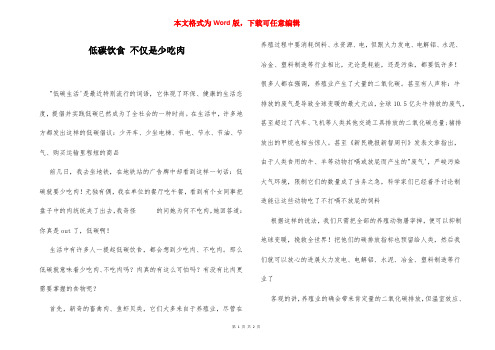
低碳饮食不仅是少吃肉"低碳生活'是最近特别流行的词语,它体现了环保、健康的生活态度,提倡并实践低碳已然成为了全社会的一种时尚。
在生活中,许多地方都发出这样的低碳倡议:少开车、少坐电梯、节电、节水、节油、节气、购买运输里程短的商品前几日,我去坐地铁,在地铁站的广告牌中却看到这样一句话:低碳就要少吃肉!无独有偶,我在单位的餐厅吃午餐,看到有个女同事把盘子中的肉统统夹了出去,我奇怪的问她为何不吃肉,她回答道:你真是out了,低碳啊!生活中有许多人一提起低碳饮食,都会想到少吃肉、不吃肉。
那么低碳就意味着少吃肉、不吃肉吗?肉真的有这么可怕吗?有没有比肉更需要掌握的食物呢?首先,新奇的畜禽肉、鱼虾贝类,它们大多来自于养殖业,尽管在养殖过程中要消耗饲料、水资源、电,但跟火力发电、电解铝、水泥、冶金、塑料制造等行业相比,无论是耗能,还是污染,都要低许多!很多人都在强调,养殖业产生了大量的二氧化碳。
甚至有人声称:牛排放的废气是导致全球变暖的最大元凶,全球10.5亿头牛排放的废气,甚至超过了汽车、飞机等人类其他交通工具排放的二氧化碳总量;猪排放出的甲烷也相当惊人。
甚至《新民晚报新智周刊》发表文章指出,由于人类食用的牛、羊等动物打嗝或放屁而产生的"废气',严峻污染大气环境,限制它们的数量成了当务之急,科学家们已经着手讨论制造能让这些动物吃了不打嗝不放屁的饲料根据这样的说法,我们只需把全部的养殖动物屠宰掉,便可以抑制地球变暖,挽救全世界!把他们的碳排放指标也预留给人类,然后我们就可以放心的进展火力发电、电解铝、水泥、冶金、塑料制造等行业了客观的讲,养殖业的确会带来肯定量的二氧化碳排放,但温室效应、全球变暖是由于养殖的动物太多引起的吗?掌握了养殖业就低碳了吗?明显这种"抓了芝麻,丢了西瓜'的说法,是不能让人信服的!其次,假如根据少吃肉、不吃肉就是低碳的说法,那么同样来自于养殖业的鸡蛋、牛奶也应当进行限制!由于它们的生产同样会产生二氧化碳。
食肉与素食的辩论辩题

食肉与素食的辩论辩题正方(食肉)观点:作为正方辩手,我认为食肉是人类的自然选择,因为人类是肉食动物。
首先,人类的牙齿和消化系统适合食肉,我们的尖牙和锋利的牙齿可以轻松地撕裂肉类食物,而我们的胃酸浓度也更适合消化肉类食物。
此外,食肉可以为人体提供更丰富的蛋白质和必需的营养物质,有助于维持健康。
众所周知,肉类食物含有丰富的铁、锌和维生素B12等营养物质,这些对于人体的生长发育和免疫力都非常重要。
此外,很多名人也支持食肉的观点。
比如,美国前总统西奥多·罗斯福曾经说过,“我不知道为什么有些人认为素食是一种高尚的生活方式。
在我看来,吃肉是一种自然的、健康的行为。
”这句话表明了食肉在一定程度上是一种正常且健康的饮食习惯。
最后,食肉也有助于经济发展。
畜牧业是许多国家的重要产业,提供了大量的就业机会和经济收入。
因此,食肉不仅符合人类的生理特点,还有助于社会的发展。
反方(素食)观点:作为反方辩手,我认为素食是更加健康和环保的饮食选择。
首先,大量的科学研究表明,素食可以降低患心脏病、高血压和糖尿病等慢性疾病的风险。
而且,素食者通常拥有更低的体重指数和更健康的胆固醇水平,这些都是健康的表现。
此外,素食还有助于环保。
养殖业是全球温室气体排放的主要来源之一,而且占据了大量的土地和水资源。
相比之下,素食所需的资源更少,有助于减少环境负担。
正如英国作家乔治·伯纳德·肖曼所说,“素食主义不仅有益于我们的健康,还有益于地球的健康。
”。
最后,素食也符合道德伦理。
许多人认为杀戮动物是一种残忍的行为,而且养殖业的条件也常常遭到批评。
因此,选择素食可以展现出对动物的尊重和爱护。
综上所述,素食不仅有利于个人健康,还有利于环境保护和道德伦理。
因此,我认为素食是更加理性和健康的饮食选择。
“低碳生活”崇尚简单自然
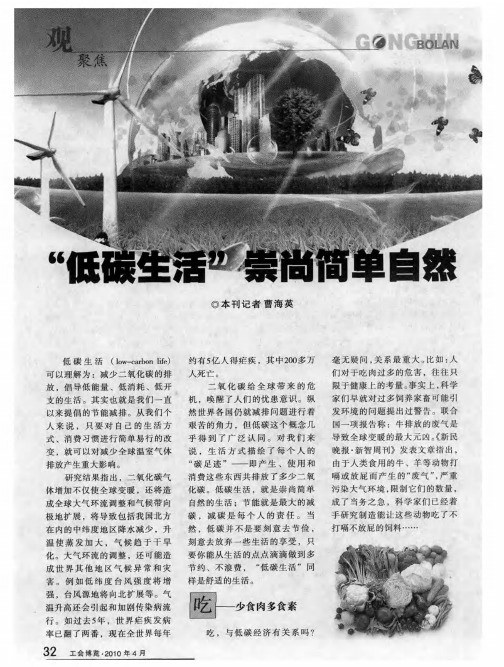
一
除 了 选 择 天 然 衣 物 面 料外 , 衣 多 穿 ,提 高 衣 物 的利 用 率 , 也 是 “ 碳 达 人 ” 的 必 修 课 。 无 低 论 是 实 用 的 生 活 用 品 ,还 是 时 尚 的 衣 饰 配 搭 ,这 种 时 尚 小 细 节 都
在 面 料 的 选 择 上 ,大 麻 纤 维
外 ,人 们喜 好 肉类 荤 食 的 风 味 和
口 感 是 主 要 原 因 。 科 学 家 已 证
ቤተ መጻሕፍቲ ባይዱ
制 成 的布 料 比棉 布更 环 保 。墨 尔
本 大 学 的 研 究 表 明 , 大 麻 布 料 对 生 态 的 影 响 比棉 布 少 5 %。 用 竹 0 纤 维 和亚 麻 做 的 布料 也 比棉 布在 生 产 过 程 中 更 节 省 水 和 农 药 。在
成 衣 制 作 、运 输 、 使 用 以 及 废 弃 后 的 处 理 ,都 在 排 放 二 氧 化 碳 并 对 环 境 造 成 一 定 的 影 响 。 低 碳 服
也更 利 于 服装 界环 保 事业 的健 康
发展 。
装 是 一 个 宽 泛 的服 装 环 保 概 念 , 泛指 町以让 我 们 每个 人 在 消 耗 全 部服 装 过程 中产 生 的碳 排 放 总量 更低 的方法 ,其 中包 括 选 用 总碳
法等。
本 ,能 够将 购买 时 的成 本 弥补 回
来 ,还 能 有 盈 余 。有 统 计 说 , 一
比如 ,把废 弃 的纯棉 牛 仔 裤手 [ 裁 片重 新 组 合 ,让它 们 变身 为 牛 仔 短 裤 、 帆 布 鞋 或 是 环 保 购 物 袋 。 另 外 ,减 少 购 买 服 装 的 频
吃素和吃肉那个更加环保?
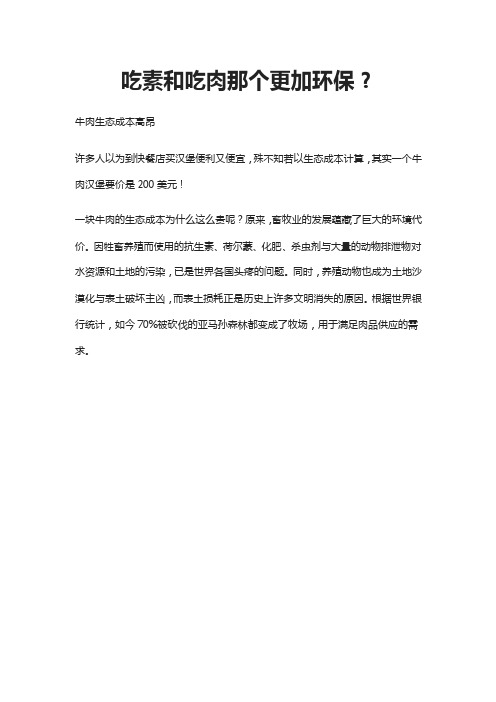
吃素和吃肉那个更加环保?牛肉生态成本高昂许多人以为到快餐店买汉堡便利又便宜,殊不知若以生态成本计算,其实一个牛肉汉堡要价是200美元!一块牛肉的生态成本为什么这么贵呢?原来,畜牧业的发展蕴藏了巨大的环境代价。
因牲畜养殖而使用的抗生素、荷尔蒙、化肥、杀虫剂与大量的动物排泄物对水资源和土地的污染,已是世界各国头疼的问题。
同时,养殖动物也成为土地沙漠化与表土破坏主凶,而表土损耗正是历史上许多文明消失的原因。
根据世界银行统计,如今70%被砍伐的亚马孙森林都变成了牧场,用于满足肉品供应的需求。
在全球气候不断变暖的今天,有专家指出,畜牧业还是全球温室气体排放的主要根源。
生产1公斤牛肉所消耗的能源,足以让一个100瓦白炽灯泡亮上20天,相当于开车3小时的碳排放。
实际上,我们消费的每种食物,包括蔬菜和水果,都暗藏环境代价:运输和冷藏食物、耕作使用的燃料,以及动植物排放的甲烷,都会增加大气中的温室气体含量。
但与牛肉比起来,这些都是小巫见大巫了。
生产牛肉排放的温室气体是生产同样重量的鸡肉的13倍,是生产土豆的57倍。
据统计,地球上的牛呼出的甲烷占了甲烷总量的20%,甲烷最初从牛的瘤胃(反刍动物的第一个胃)中分泌出来,然后进入循环系统,最后从肺呼出,而剩余的一小部分则通过打嗝排出体外。
尽管甲烷在空气中留存的时间不长就会分解,但它使酿成“温室效应”的主要气体之一,其“功力”比二氧化碳有过之而无不及。
少吃肉为环保2006年,联合国粮农组织发布了一项调查报告,显示在与人类活动相关的温室气体排放量中,牲畜的排放量占了18%,这比人类在交通运输这一块产生的温室气体还要多。
有关畜牧业对气候变暖的研究,让很多素食者有了振臂高呼的科学依据。
每年,联合国气候谈判上都有示威者高举旗帜呼吁实行素食。
最近,在欧洲议会的一个题为“全球变暖与食物政策:少吃肉=少排热”的听证会上,政府间气候变化专门委员会主席帕乔里认为,减小对肉类的食用量是一个简单易行、效果显著的减少温室气体排放的方式。
如何做到绿色环保日常生活

如何做到绿色环保日常生活绿色环保是现代社会中刻不容缓的重要任务,每个人都有责任为环保出一份力。
在日常生活中,如何做到绿色环保呢?下面将从家居生活、交通出行、饮食健康等方面展开论述。
一、家居生活家居生活是我们最常接触的环境,如何做到绿色环保呢?1. 节约用水。
家里的用水是生活中不能忽视的问题,每次使用完水龙头后要关紧,不要浪费水资源。
同时在刷牙和洗脸的时候可以使用短时间内完成清洁任务的物品。
2. 节约用电。
智能家居产品可以帮助我们实现对电能的节约和环保。
比如说,在居家关灯、调节温度和节约用电方面可以使用智能家居,而且智能家居产品的应用范围极为广泛,比如照明、光环境、安全防护等多方面。
3. 垃圾分类。
垃圾分类是现今社会中的一个重要问题,家庭垃圾分类可以采取到适当的措施.比如,将可回收物品、厨余废料,纸张、玻璃瓶、塑料袋等物品分别放置在适当的地方,这样可以大大减少垃圾对环境造成的污染。
4. 绿色家居。
选择环保材料,如无缝墙纸、空气净化器等等,可以帮助我们创造一个环保、健康的居住环境。
二、交通出行现代人的生活少不了交通出行,如何既能方便又能做到绿色环保呢?1. 骑自行车、步行。
骑自行车或步行是最方便、最环保的出行方式,不仅能锻炼身体,而且可以减少车辆尾气对环境污染的问题。
2. 公共交通工具。
使用公共交通工具,比如公交车、地铁等可以很好的减少汽车的使用,从而减少对环境的污染问题。
此外还能更好地避免交通拥堵和汽车停放带来的不便问题。
3. 减少驾车,尽量少开车。
不开车时可以从多个方面帮助我们避免对环境的污染,比如说,减少尾气、降低油耗、削减今后的开支等等。
三、饮食健康饮食健康与环保息息相关。
如何在饮食上做到绿色环保呢?1. 合理搭配饮食。
科学搭配饮食能够更好地保护我们的身体健康,比如说,多吃蔬菜、水果、少吃肉类可以大大减少环境的污染问题。
2. 精简烹饪。
做菜时可以尽量节约食材,精简烹饪等等,这样既可以减少食物浪费,同时更能提高食材利用率。
是否应该禁止吃肉辩论辩题
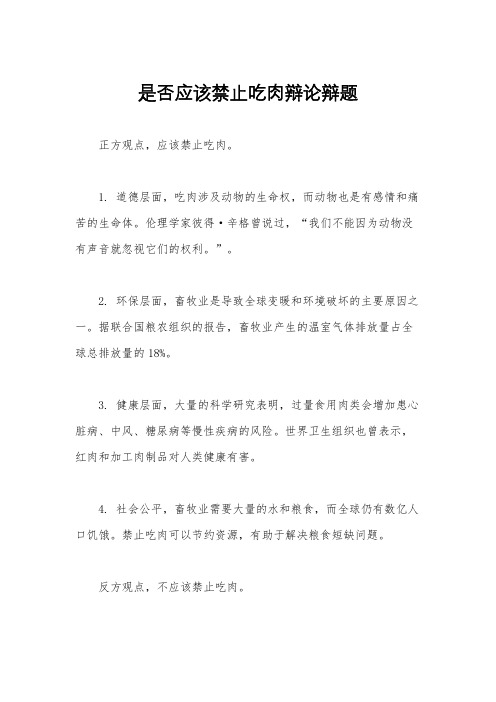
是否应该禁止吃肉辩论辩题正方观点,应该禁止吃肉。
1. 道德层面,吃肉涉及动物的生命权,而动物也是有感情和痛苦的生命体。
伦理学家彼得·辛格曾说过,“我们不能因为动物没有声音就忽视它们的权利。
”。
2. 环保层面,畜牧业是导致全球变暖和环境破坏的主要原因之一。
据联合国粮农组织的报告,畜牧业产生的温室气体排放量占全球总排放量的18%。
3. 健康层面,大量的科学研究表明,过量食用肉类会增加患心脏病、中风、糖尿病等慢性疾病的风险。
世界卫生组织也曾表示,红肉和加工肉制品对人类健康有害。
4. 社会公平,畜牧业需要大量的水和粮食,而全球仍有数亿人口饥饿。
禁止吃肉可以节约资源,有助于解决粮食短缺问题。
反方观点,不应该禁止吃肉。
1. 个人自由,每个人都有选择自己饮食习惯的权利,禁止吃肉
是对个人自由的侵犯。
2. 营养均衡,肉类是人类获取蛋白质和铁元素的重要来源,对
于一些人来说,特别是儿童和孕妇,肉类是必不可少的营养来源。
3. 经济影响,畜牧业是许多国家的重要产业之一,禁止吃肉将
导致大量农民失业,对经济造成负面影响。
4. 文化传统,在许多文化中,肉类是重要的饮食组成部分,禁
止吃肉将损害这些文化传统。
综上所述,虽然禁止吃肉有其道德、环保和健康等方面的优点,但也需要考虑个人自由、营养均衡、经济影响和文化传统等因素。
因此,在实施相关政策时需要权衡各方利益,寻求平衡。
低碳饮食标准

低碳饮食标准
低碳饮食是指通过减少碳排放和资源消耗,以减少对环境的影响。
在当今社会,随着人们对环保意识的提高,低碳饮食已经成为一种健康、环保的生活方式。
那么,什么样的饮食才可以被称为低碳饮食呢?本文将从食材选择、饮食习惯和生活方式等方面,为您介绍低碳饮食的标准。
首先,低碳饮食的核心是选择低碳食材。
在蔬菜水果方面,选择本地生产的季
节性蔬菜水果,减少长途运输和储藏所产生的能源消耗。
同时,减少肉类摄入,尤其是牛羊肉等高碳排放的肉类,适量摄入鱼类和禽类。
此外,选择有机食材和未经过过度加工的食品,也是低碳饮食的重要选择。
其次,低碳饮食还需要改变饮食习惯。
减少食物浪费是低碳饮食的重要环节。
合理规划餐饮,适量点菜,不浪费食物,是每个人都可以做到的。
此外,选择清淡口味,减少油腻食物的摄入,不仅有益于健康,也有利于减少食物加工和烹饪所消耗的能源。
最后,低碳饮食还需要改变生活方式。
选择步行、骑行等低碳出行方式,减少
机动车使用,是减少碳排放的有效途径。
同时,减少使用一次性塑料制品,选择可降解材料制品,也是低碳生活的一部分。
总之,低碳饮食标准是一个综合性的概念,需要从食材选择、饮食习惯和生活
方式等多个方面来考虑。
只有我们每个人都能够从自身做起,改变饮食和生活方式,才能真正实现低碳饮食的目标,为环境保护和可持续发展做出自己的贡献。
希望通过本文的介绍,能够让更多的人了解低碳饮食的标准,从而共同为地球的美好未来努力。
《健康与环保的新饮食》
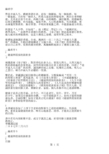
空老和尚告訴我們,在家人做菜使用少許蔥、蒜調味,並不礙事,因
為量很少不起作用。
影響情緒的好壞,最明顯的是酒,特別是酗酒,酒醉會亂性。所
以,佛家制定戒律,將飲酒列入重戒,就是怕你喝醉亂性。如果是佐
料酒,放入菜餚裡調味,不會喝醉就沒有關係,這就是開緣。佛制定
的每一條戒律,都有開遮持犯,不是死板的,生活應該是活活潑潑的。
..不要錯會惜福的意思
學佛人常講“惜福”,但往往又將惜福的意思錯會了。
佛陀當年在世,出家人的生活是“三衣一缽”。如果今天托的飯
菜很多,這一餐吃不完,可不可以留到明天吃?不可以。佛的制度是
你吃飽之後,多餘的要供養牲畜鳥獸,不可以留到第二天,這是有道
肉不能吃魚能不能
吃
32
人類吃素食是符合自然法
則
32
觀牙齒觀腸子觀手
指
32
自然反
應
33
..-
..
素食是環保的飲
食
34
食肉對環保的危
害
35
無畏布施得健康長
壽
38
忌食十大垃圾食
物
42
結
語
48
.Байду номын сангаас
..-
什麼?心。因此,佛講養生之道,特別著重慈悲心。佛法講:“依報
隨著正報轉。”身是依報,心是正報,心理健康,生理就健康,飲食
方面再稍加注意,就會過得非常好。心理不健康,生理無論如何調養
亦無濟於事,所以慈悲心比什麼都重要。歡喜心是我們生命中最豐富
的營養,什麼補藥都沒有歡喜心好。
健康饮食新趋势:素食主义的益处及实践建议
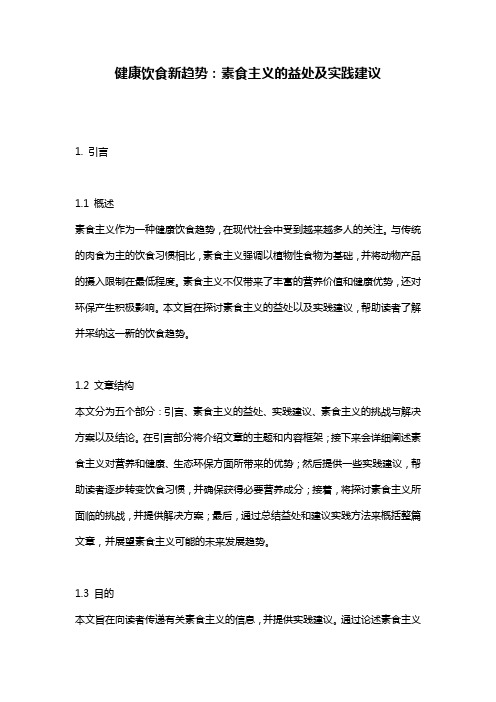
健康饮食新趋势:素食主义的益处及实践建议1. 引言1.1 概述素食主义作为一种健康饮食趋势,在现代社会中受到越来越多人的关注。
与传统的肉食为主的饮食习惯相比,素食主义强调以植物性食物为基础,并将动物产品的摄入限制在最低程度。
素食主义不仅带来了丰富的营养价值和健康优势,还对环保产生积极影响。
本文旨在探讨素食主义的益处以及实践建议,帮助读者了解并采纳这一新的饮食趋势。
1.2 文章结构本文分为五个部分:引言、素食主义的益处、实践建议、素食主义的挑战与解决方案以及结论。
在引言部分将介绍文章的主题和内容框架;接下来会详细阐述素食主义对营养和健康、生态环保方面所带来的优势;然后提供一些实践建议,帮助读者逐步转变饮食习惯,并确保获得必要营养成分;接着,将探讨素食主义所面临的挑战,并提供解决方案;最后,通过总结益处和建议实践方法来概括整篇文章,并展望素食主义可能的未来发展趋势。
1.3 目的本文旨在向读者传递有关素食主义的信息,并提供实践建议。
通过论述素食主义对营养、健康和环保的积极影响,希望读者能够意识到采纳素食主义对个人和社会的益处。
同时,为那些希望尝试素食主义却不知从何开始的人们提供了一些逐步转变饮食习惯以及满足必要营养需求的实用建议。
通过强调素食主义理念并推动其发展,相信我们可以共同迈向更加健康、可持续和环保的未来。
2. 素食主义的益处2.1 营养价值素食主义被认为是一种营养均衡的饮食方式。
植物性食物包含丰富的膳食纤维、维生素和矿物质,例如水果、蔬菜、全谷物、豆类和坚果种子。
这些食物提供人体所需的重要营养素,例如维生素C、叶酸、钙和铁等。
此外,植物性蛋白质也可以通过摄入豆类和其他植物来源的蛋白质来得到满足。
2.2 健康优势采用素食主义有助于降低肥胖率和患心脏病、中风和高血压等慢性疾病的风险。
大量实证研究表明,与非素食者相比,素食者通常拥有更低的总胆固醇、低密度脂蛋白胆固醇(“坏”胆固醇)以及更好的血压控制。
研究:少吃肉既健康又环保51

研究:少吃肉既健康又环保Cutting meat production and consump-tion by 30 percent would help to reduce carbon emissions and improve health in the most meat-loving nations, scientists said recently.Using prediction models, British and Australian researchers found that improving efficiency, increasing carbon capture and reducing fossil fuel dependence in farming would not be enough to meet emissions targets. But combining these steps with a 30 percent reduction in livestock production in major meat-producing nations and a similar cut in meat-eating, would lead to “substan tial population health benefits”and cut emissions, they said.The study found that in Britain, a 30 percent lower intake of animal-source saturated fat by adults would reduce the number of premature deaths from heart disease by some 17 percent—equivalent to 18,000 premature deaths averted in one year.In San Paulo, Brazil, it could mean as many as 1,000 premature deaths averted in a year, they said.According to the United Nations Food and Agricultural Organization, 18 percent of all greenhouse gas emissions are from meat production and experts say rising demand for meat, particularly in countries with growing economies, could drive live-stock production up by 85 percent from 2000 levels by 2030.The scientists said global action was needed to maximize the benefits of cutting meat production and consumption, and that the environmental advantages “may apply only in those countries that currently have high production levels”.In a second study, British scientists found that increased walking and cycling, and fewer cars,would have a much greater impact on health than low-emission vehicles in rich and middle-income countries.科学家最近称,如果将最爱食肉国家的肉类生产和消费量减少30%,那么将有助于减少碳排放和改善人们的健康状况。
如何在日常生活中践行低碳环保的生活方式
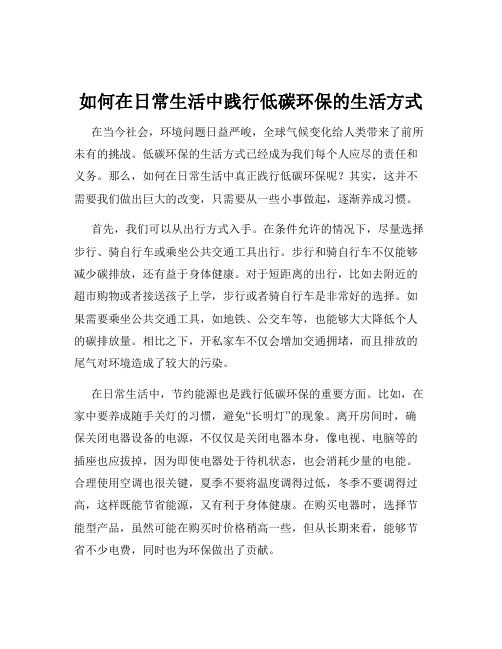
如何在日常生活中践行低碳环保的生活方式在当今社会,环境问题日益严峻,全球气候变化给人类带来了前所未有的挑战。
低碳环保的生活方式已经成为我们每个人应尽的责任和义务。
那么,如何在日常生活中真正践行低碳环保呢?其实,这并不需要我们做出巨大的改变,只需要从一些小事做起,逐渐养成习惯。
首先,我们可以从出行方式入手。
在条件允许的情况下,尽量选择步行、骑自行车或乘坐公共交通工具出行。
步行和骑自行车不仅能够减少碳排放,还有益于身体健康。
对于短距离的出行,比如去附近的超市购物或者接送孩子上学,步行或者骑自行车是非常好的选择。
如果需要乘坐公共交通工具,如地铁、公交车等,也能够大大降低个人的碳排放量。
相比之下,开私家车不仅会增加交通拥堵,而且排放的尾气对环境造成了较大的污染。
在日常生活中,节约能源也是践行低碳环保的重要方面。
比如,在家中要养成随手关灯的习惯,避免“长明灯”的现象。
离开房间时,确保关闭电器设备的电源,不仅仅是关闭电器本身,像电视、电脑等的插座也应拔掉,因为即使电器处于待机状态,也会消耗少量的电能。
合理使用空调也很关键,夏季不要将温度调得过低,冬季不要调得过高,这样既能节省能源,又有利于身体健康。
在购买电器时,选择节能型产品,虽然可能在购买时价格稍高一些,但从长期来看,能够节省不少电费,同时也为环保做出了贡献。
在饮食方面,我们也可以为低碳环保出一份力。
尽量减少食物的浪费,根据实际需求购买和烹饪食物。
在餐厅就餐时,如果吃不完,可以选择打包带走。
多选择本地生产的食材,因为这样可以减少运输过程中的碳排放。
此外,少吃肉类,尤其是牛肉和羊肉,因为畜牧业的碳排放相对较高。
增加蔬菜、水果和谷物的摄入,不仅对健康有益,也对环境更加友好。
在购物时,我们要有环保意识。
自带环保购物袋,减少一次性塑料袋的使用。
一次性塑料袋不仅难以降解,还会对环境造成严重的污染。
尽量选择包装简单的商品,避免购买过度包装的物品。
对于一些可重复使用的物品,如杯子、餐具等,优先选择耐用且可循环使用的材质。
是否应该禁止吃肉辩论辩题
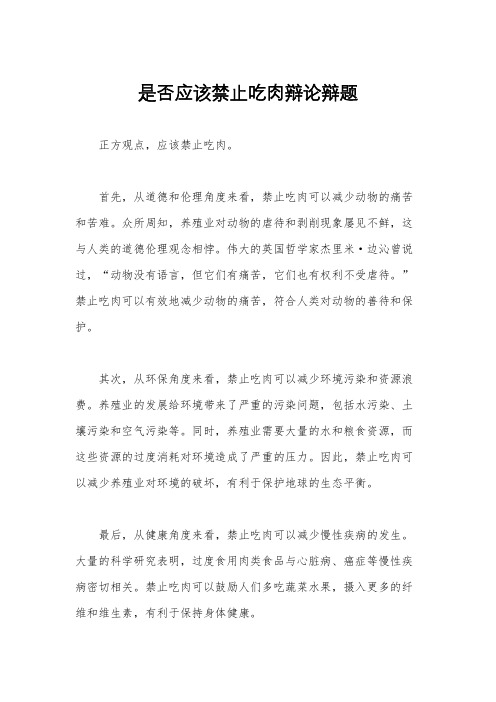
是否应该禁止吃肉辩论辩题正方观点,应该禁止吃肉。
首先,从道德和伦理角度来看,禁止吃肉可以减少动物的痛苦和苦难。
众所周知,养殖业对动物的虐待和剥削现象屡见不鲜,这与人类的道德伦理观念相悖。
伟大的英国哲学家杰里米·边沁曾说过,“动物没有语言,但它们有痛苦,它们也有权利不受虐待。
”禁止吃肉可以有效地减少动物的痛苦,符合人类对动物的善待和保护。
其次,从环保角度来看,禁止吃肉可以减少环境污染和资源浪费。
养殖业的发展给环境带来了严重的污染问题,包括水污染、土壤污染和空气污染等。
同时,养殖业需要大量的水和粮食资源,而这些资源的过度消耗对环境造成了严重的压力。
因此,禁止吃肉可以减少养殖业对环境的破坏,有利于保护地球的生态平衡。
最后,从健康角度来看,禁止吃肉可以减少慢性疾病的发生。
大量的科学研究表明,过度食用肉类食品与心脏病、癌症等慢性疾病密切相关。
禁止吃肉可以鼓励人们多吃蔬菜水果,摄入更多的纤维和维生素,有利于保持身体健康。
综上所述,从道德伦理、环保和健康角度来看,禁止吃肉是一种积极的做法,有利于保护动物、环境和人类自身的健康。
反方观点,不应该禁止吃肉。
首先,从人类的饮食习惯和营养需求来看,肉类是人类的重要营养来源之一。
肉类中含有丰富的蛋白质、铁、锌等营养物质,对人体的生长发育和健康至关重要。
如果禁止吃肉,可能会导致人们营养不良,影响身体健康。
其次,从经济角度来看,禁止吃肉将对养殖业和相关产业造成严重的冲击。
养殖业是许多国家的重要产业之一,禁止吃肉将导致养殖业的倒闭和大量的失业问题。
同时,肉类的供应量将大幅减少,导致肉类价格飙升,给普通消费者带来生活压力。
最后,从文化传统和个人选择角度来看,禁止吃肉侵犯了人们的饮食自由权。
各国有着不同的饮食文化和传统,禁止吃肉将对人们的饮食习惯和生活方式造成干扰,限制了人们的个人选择权。
综上所述,从营养需求、经济影响和个人选择角度来看,不应该禁止吃肉,而是应该通过合理的养殖和食用方式来保护动物、环境和人类健康。
生活知识_低碳生活小常识大全

低碳生活小常识大全低碳生活小常识大全1. 什么是低碳生活?低碳生活是指人们生活作息时所耗用能量要减少,从而减低碳,特别是二氧化碳的排放。
简单来说,低碳生活就是从节俭的角度出发返璞归真地进行人与自然的活动。
低碳生活,对于普通民众来说,是一种理念,一种态度,一种责任。
我们应积极提倡并实践低碳生活,从点滴做起,注意节电、节油、节气、节水,节约一切能源和资源。
2. 什么服装比较低碳?任何一件衣服,从它还是庄稼地里的棉花、亚麻开始,就会消耗无数资源。
它要经过漂白、染色的工艺才能变成纱线、面料,经历成衣制作、物流和使用后,最终被焚烧、降解,每个生产加工环节都有碳排放发生。
别小瞧了衣服的碳排放量,以最常见的纯棉和化纤面料的服装计算,我们的衣柜一年因新添服装而排放的二氧化碳至少就有1000千克。
按照每季只买两件T恤(250克/件)、两件衬衫(250克/件)、两件外套(500克/件)计算,不经任何染色印花处理,纯棉服装的碳排放量总计约为224千克,化纤服装的碳排放量约为1504千克,一旦选择了有颜色和图案的服装,再加上皮革、羊毛等服装,衣柜里每年新添服装的碳排放量远不止1000千克。
因此,要成为“低碳达人”,首先就要选择天然面料服装,远离化纤类服装。
研究发现,一件纯棉衣物在其生命周期中排放的二氧化碳约为7千克,一件化纤衣物则高达47千克。
3. 少用洗衣机,手洗更低碳?虽然洗衣机给生活带来很大的帮助,但只有两三件衣物就用机洗,会造成水和电的浪费。
如果每月用手洗代替一次机洗,每台洗衣机每年可节能约1.4千克标准煤,相应减排二氧化碳3.6千克。
即使用洗衣机,如在不急需穿着的情况下,可不用洗衣机甩干,而是让其自然晾干,可减少2.3公斤的二氧化碳排放量。
4. 低碳烹饪有哪些方法?食用油在加热时不易过热,否则产生致癌物,并造成油烟污染居室环境。
减少煎炒烹炸的菜肴,多煮食蔬菜。
不要把饭锅和水壶装得太满,否则煮沸后溢出汤水,既铺张能源,又轻易扑灭灶火,引发燃气泄漏。
多吃素,少吃肉,环保救地球 - 中学生网站
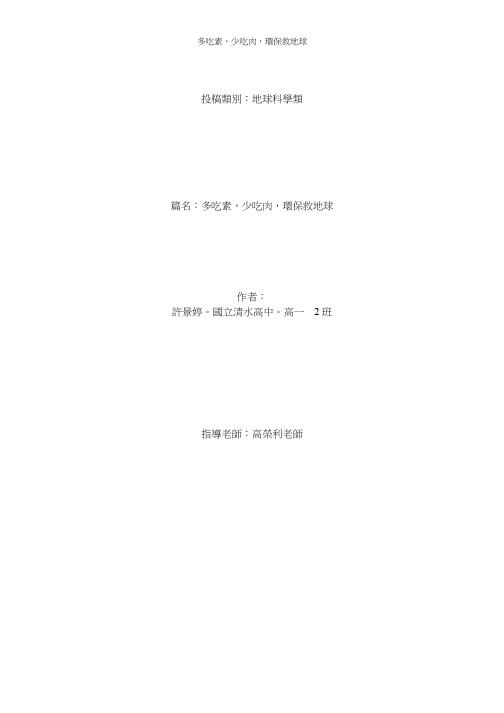
投稿類別:地球科學類篇名:多吃素,少吃肉,環保救地球作者:許景婷。
國立清水高中。
高一2班指導老師:高榮利老師壹●前言因為人類不斷的破壞,我們人類唯一的家─地球,已不復以往那麼美麗,許許多多的汙染不斷在我們週遭產生,各地災害頻傳,南亞大海嘯、日本三一一大地震、卡崔娜颶風、雨林地的減少、山坡地的迅速開發‧‧‧,這個原來美麗的家已是滿目瘡痍,其中令人類最大需要解決及共同搶救之一的即是全球暖化所帶來的危害,極地冰融、陸地下沉、野生動物消失、旱災和沙漠化‧‧‧等,都是人類正極力搶救的全球環境問題,但我們如何更有效的遏止這些災害發生?其中「食素」便是一項又快又簡單方便的方式,就像有一句話說:「吃素‧環保‧救地球」一樣,不但能拯救自己,也能拯救地球及飢荒。
貳●正文一、全球暖化造成的危害『溫室效應是地球生命得以存續的基礎,但工業革命後人類活動加劇了溫室效應,造成全球暖化,然而並不是每個地方都會愈來愈熱,而是「極端氣候」成為常態』〈註一〉,如大豪雨、乾旱、極寒與酷熱,同時極地冰融、陸地下沉與氣氣候難民、死亡海域、破紀錄高溫、野生動物消失、暴風增加、旱災和沙漠化、冰河退縮與水源短缺及人類健康的危害〈蚊患增多、豬流感、禽流感、狂牛症等〉,都是全球暖化所造成的危害,對於諸多的危害,人類應謹慎及積極尋求解決之道。
圖一極圈內的冰層迅速融化〈註二〉圖二死亡海域〈註三〉二、畜牧業對全球暖化的影響在造成全球暖化的危害當中,畜牧業是其最大的元兇,『它排放的溫室氣體量佔全球總量18%,而其中二氧化碳畜牧業佔9%排放量;甲烷畜牧業佔35~40%的排放量;一氧化二氮畜牧業則佔了65%的排放量』〈註四〉,而不僅如此,畜牧業還造成土壤貧瘠、生態破壞、糧食短缺、水源污染、酸雨不斷、能源耗損等,對環境是一項很大的衝擊。
『砍伐森林是爲了生產肉類所需的場地。
研究森林砍伐後土地使用的學者所做的結論是:「砍伐森林後所形成的農地,肉類生產量是一般牧地的三倍多。
人类是否应该吃素辩论辩题

人类是否应该吃素辩论辩题正方,人类应该吃素。
首先,从健康角度来看,吃素对人类健康有益。
许多研究表明,素食者通常比肉食者更健康,他们患心脏病、高血压、糖尿病等慢性疾病的风险较低。
而且,素食还有助于减肥和保持健康的体重,因为蔬菜和水果通常比肉类和乳制品低卡路里。
其次,从环保角度来看,素食有助于减少对地球的压力。
畜牧业是温室气体排放的主要来源之一,而且也占用了大量的土地和水资源。
如果更多人转向素食,将有助于减少对环境的破坏。
再者,从道德角度来看,吃素符合对动物的尊重。
动物在工厂养殖场中常常遭受虐待,而且被宰杀时也常常遭受极大的痛苦。
吃素可以减少对动物的残忍对待,体现了人类对其他生物的尊重。
名人名句方面,印度的圣雄甘地曾说过,“一个国家和一个人的道德进步是以它对动物的态度来衡量的。
”这句话表明了人类应该对动物负责任,而吃素是尊重动物的表现。
反方,人类不应该吃素。
首先,从营养角度来看,肉类是人类获取蛋白质和维生素B12的重要来源,如果完全不吃肉,可能会导致营养不均衡,影响健康。
其次,从文化角度来看,许多文化和宗教习惯肉食,比如中国的春节必吃的年夜饭,以及基督教的复活节烤羊肉等。
如果强制要求人类都吃素,可能会侵犯到人们的文化和宗教自由。
再者,从经济角度来看,许多农民和养殖户依靠畜牧业维持生计,如果大规模推广素食,可能会导致他们失业,对经济造成影响。
经典案例方面,有许多素食者因为缺乏蛋白质和维生素B12而出现健康问题,这证明了完全不吃肉可能会对健康造成负面影响。
综上所述,人类是否应该吃素是一个复杂的问题,需要综合考虑健康、环保、道德、文化和经济等多个方面的因素。
在实际生活中,可以适当减少肉类摄入,但完全不吃肉可能并不是最好的选择。
十条环保小建议
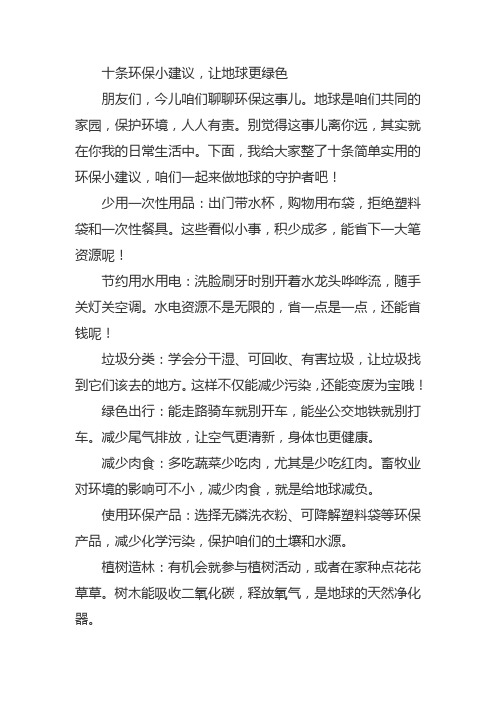
十条环保小建议,让地球更绿色朋友们,今儿咱们聊聊环保这事儿。
地球是咱们共同的家园,保护环境,人人有责。
别觉得这事儿离你远,其实就在你我的日常生活中。
下面,我给大家整了十条简单实用的环保小建议,咱们一起来做地球的守护者吧!少用一次性用品:出门带水杯,购物用布袋,拒绝塑料袋和一次性餐具。
这些看似小事,积少成多,能省下一大笔资源呢!节约用水用电:洗脸刷牙时别开着水龙头哗哗流,随手关灯关空调。
水电资源不是无限的,省一点是一点,还能省钱呢!垃圾分类:学会分干湿、可回收、有害垃圾,让垃圾找到它们该去的地方。
这样不仅能减少污染,还能变废为宝哦!绿色出行:能走路骑车就别开车,能坐公交地铁就别打车。
减少尾气排放,让空气更清新,身体也更健康。
减少肉食:多吃蔬菜少吃肉,尤其是少吃红肉。
畜牧业对环境的影响可不小,减少肉食,就是给地球减负。
使用环保产品:选择无磷洗衣粉、可降解塑料袋等环保产品,减少化学污染,保护咱们的土壤和水源。
植树造林:有机会就参与植树活动,或者在家种点花花草草。
树木能吸收二氧化碳,释放氧气,是地球的天然净化器。
减少打印复印:能电子化的东西就别打印了,非得打印的话,也尽量双面打印,减少纸张浪费。
支持环保企业和项目:购物时选择环保标志的产品,支持那些致力于环保的企业和项目。
你的选择,就是力量!传播环保理念:把自己知道的环保知识告诉家人朋友,一起行动起来。
人多力量大,咱们一起为地球加油!朋友们,环保不是一句口号,而是需要我们每个人付诸实践的行动。
从身边的小事做起,从现在做起,让咱们的地球变得更加绿色、更加美好!。
是否应该提倡素食主义辩论辩题?

是否应该提倡素食主义辩论辩题?正方,应该提倡素食主义。
观点一,环保。
素食主义可以减少对动物的屠杀,减少畜牧业对环境的破坏,有利于保护地球生态平衡。
据联合国粮食及农业组织的数据显示,全球畜牧业排放的温室气体占总排放量的18%,比汽车、飞机等交通工具的排放量还要高。
素食主义可以有效减少这部分排放,有利于减缓气候变化。
观点二,健康。
素食主义有助于减少心脏病、高血压、糖尿病等慢性疾病的发病率。
根据世界卫生组织的数据,每年因为肉类摄入导致的疾病死亡人数高达数百万。
而素食主义者通常摄入更多的蔬菜、水果、全谷类食品,这些食物富含纤维、维生素和矿物质,对健康有益。
观点三,道德。
素食主义可以减少对动物的伤害,尊重生命,符合人道主义精神。
伟大的印度领袖甘地曾说过,“一个国家和它的道德进步可以按照它对待动物的方式来衡量。
”素食主义可以提高人们对动物的尊重,培养人们的慈悲之心。
反方,不应该提倡素食主义。
观点一,人类的天性。
人类是一种杂食动物,从生理结构上来看,人类的牙齿和消化系统都适合于食用肉类和植物食物。
因此,素食主义违背了人类的天性。
观点二,营养均衡。
肉类是人类获得蛋白质和铁元素的重要来源,而且动物性蛋白质的生物利用率更高,更容易被人体吸收。
如果完全放弃肉类,可能会导致营养不均衡,影响身体健康。
观点三,个人选择。
每个人都有权利选择自己的饮食习惯,素食主义者不应该强加自己的观点给其他人。
正如美国作家马克·吐温所说,“每个人都有权利表达自己的观点,但没有权利强加给别人。
”。
综上所述,虽然素食主义有利于环保、健康和道德,但不应该强制推广,应该尊重每个人的个人选择。
绿色低碳
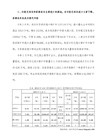
限塑令开始这么久了,你行动了吗?是不好意思拿个袋子,还是不方便,还是其他原因呢?你拿一个免费的塑料袋,但产生的环境污染可是有代价的。
九、节约纸张
你知道造纸业一向是污染严重的大户吗?生产过程中会排放大量废气、废水。如果我们在办公室中准备一个手帕擦手、擦汗,那么也会节约很多纸张。
节能环保,共迎美好
所谓低碳生活就是一种绿色、健康、环保的生活方式。它呼唤人们,从生活的各个细节出发,节约地球上的有限资源,保护地球环境,关心地球健康。
当全球变暖威胁人类生存环境,当狂风、暴雨、地震、高温、严寒等各种极端气候事件在全球频繁出现,人们开始意识到人类活动对地球生态环境的巨大影响。自工业革命以来,人类不断消耗石油资源,产生大量二氧化碳,造成了全球变暖。而对森林的破坏,更加剧了全球变暖的速度。当地球温度上升6度时,地球上只有细菌可以生存。
点点滴滴,看来是微不足道的。但正是这样的点点滴滴,使居民区能源浪费现象显得相当突出。检查我们的行为,司空见惯的“无意识浪费”,在家庭生活中浪费掉的宝贵能源实在太多了。习惯成自然,且有很多浪费现象是人们长期养成的习惯,又习以为常,因此在节约家庭能源方面考虑得不多。然而在现实生活中,我们要改掉那些不经意的浪费“习惯”,其实很简单,只需要举手之劳。良好的生活和工作环境是我们人类赖以生存的条件,保护环境就是保护我们自己。面对地球生态环境日益恶化、资源日益短缺的现实,我们应该清醒地认识到:拯救地球、保护环境、节约能源,是我们共同的责任。家庭节能环保和我们的生活息息相关,而且很容易进行,做好家庭的节能环保工作,不仅节约了资源,也为家庭节约了一定开支,一举两得。由此我们发出倡议:
三、少开车、骑单车、多步行
每消耗一公升汽油就会产生2.25千克二氧化碳。如果路近的话,骑车或步行是一个好的选择。何况现在路面拥挤,而我们每天忙碌,骑车或步行也是一种很好的锻炼方式,还能调整心情,真是一举两得啊。
低碳饮食
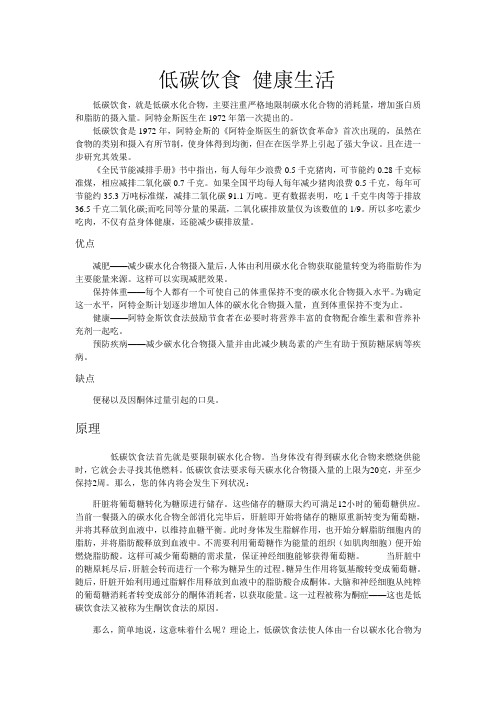
低碳饮食健康生活低碳饮食,就是低碳水化合物,主要注重严格地限制碳水化合物的消耗量,增加蛋白质和脂肪的摄入量。
阿特金斯医生在1972年第一次提出的。
低碳饮食是1972年,阿特金斯的《阿特金斯医生的新饮食革命》首次出现的,虽然在食物的类别和摄入有所节制,使身体得到均衡,但在在医学界上引起了强大争议。
且在进一步研究其效果。
《全民节能减排手册》书中指出,每人每年少浪费0.5千克猪肉,可节能约0.28千克标准煤,相应减排二氧化碳0.7千克。
如果全国平均每人每年减少猪肉浪费0.5千克,每年可节能约35.3万吨标准煤,减排二氧化碳91.1万吨。
更有数据表明,吃1千克牛肉等于排放36.5千克二氧化碳;而吃同等分量的果蔬,二氧化碳排放量仅为该数值的1/9。
所以多吃素少吃肉,不仅有益身体健康,还能减少碳排放量。
优点减肥——减少碳水化合物摄入量后,人体由利用碳水化合物获取能量转变为将脂肪作为主要能量来源。
这样可以实现减肥效果。
保持体重——每个人都有一个可使自己的体重保持不变的碳水化合物摄入水平。
为确定这一水平,阿特金斯计划逐步增加人体的碳水化合物摄入量,直到体重保持不变为止。
健康——阿特金斯饮食法鼓励节食者在必要时将营养丰富的食物配合维生素和营养补充剂一起吃。
预防疾病——减少碳水化合物摄入量并由此减少胰岛素的产生有助于预防糖尿病等疾病。
缺点便秘以及因酮体过量引起的口臭。
原理低碳饮食法首先就是要限制碳水化合物。
当身体没有得到碳水化合物来燃烧供能时,它就会去寻找其他燃料。
低碳饮食法要求每天碳水化合物摄入量的上限为20克,并至少保持2周。
那么,您的体内将会发生下列状况:肝脏将葡萄糖转化为糖原进行储存。
这些储存的糖原大约可满足12小时的葡萄糖供应。
当前一餐摄入的碳水化合物全部消化完毕后,肝脏即开始将储存的糖原重新转变为葡萄糖,并将其释放到血液中,以维持血糖平衡。
此时身体发生脂解作用,也开始分解脂肪细胞内的脂肪,并将脂肪酸释放到血液中。
- 1、下载文档前请自行甄别文档内容的完整性,平台不提供额外的编辑、内容补充、找答案等附加服务。
- 2、"仅部分预览"的文档,不可在线预览部分如存在完整性等问题,可反馈申请退款(可完整预览的文档不适用该条件!)。
- 3、如文档侵犯您的权益,请联系客服反馈,我们会尽快为您处理(人工客服工作时间:9:00-18:30)。
研究:少吃肉既健康又环保
发表时间:2010-11-10T14:32:32.250Z 来源:《英语周报》(高中教师版)2010年第12期供稿作者:常温
[导读] 研究人员称,在巴西圣保罗市,这意味着每年可避免一千个早死病例。
常温
Cutting meat production and consump-tion by 30 percent would help to reduce carbon emissions and improve health in the most meat-loving nations, scientists said recently.
Using prediction models, British and Australian researchers found that improving efficiency, increasing carbon capture and reducing fossil fuel dependence in farming would not be enough to meet emissions targets. But combining these steps with a 30 percent reduction in livestock production in major meat-producing nations and a similar cut in meat-eating, would lead to “substan tial population health benefits”and cut emissions, they said.
The study found that in Britain, a 30 percent lower intake of animal-source saturated fat by adults would reduce the number of premature deaths from heart disease by some 17 percent—equivalent to 18,000 premature deaths averted in one year.
In San Paulo, Brazil, it could mean as many as 1,000 premature deaths averted in a year, they said.
According to the United Nations Food and Agricultural Organization, 18 percent of all greenhouse gas emissions are from meat production and experts say rising demand for meat, particularly in countries with growing economies, could drive live-stock production up by 85 percent from 2000 levels by 2030.
The scientists said global action was needed to maximize the benefits of cutting meat production and consumption, and that the environmental advantages “may apply only in those countries that currently have high production levels”.
In a second study, British scientists found that increased walking and cycling, and fewer cars, would have a much greater impact on health than low-emission vehicles in rich and middle-income countries.
科学家最近称,如果将最爱食肉国家的肉类生产和消费量减少30%,那么将有助于减少碳排放和改善人们的健康状况。
英国和澳大利亚的研究人员通过使用预测模型进行研究后发现,仅靠提高能源使用率尧增加碳收集以及降低农业对矿物燃料的依赖还不足以实现减排目标。
但研究人员称,如果在此基础上将肉类主要生产国的家畜产量和肉类消费分别降低30%,则可“极大地增进人们的健康”,同时减少碳排放。
研究发现,在英国,如果成年人摄入的动物饱和脂肪量减少30%,那么因心脏病而早逝的病例可减少17%,相当于一年避免1.8 万个早死病例。
研究人员称,在巴西圣保罗市,这意味着每年可避免一千个早死病例。
联合国粮农组织的数据显示,18%的温室气体排放来自于肉类生产。
专家称,到2030 年,不断增长的肉类需求,尤其是发展中经济体的肉类需求将推动家畜产量在2000 年的基础上增长85%。
科学家表示,世界各国需采取行动,将减少肉类生产消费的益处最大化,由此产生的环境优势“可能只适用于目前肉类生产量较高的国家”。
在另一项研究中,英国科学家发现,在富裕和中等收入国家,多走路骑车尧少开车对于健康的益处比乘坐低排放量的交通工具要大很多。
